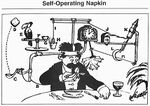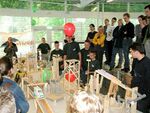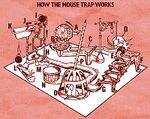Rube Goldberg
Reuben ("Rube") Lucius Goldberg (July 4, 1883–December 7, 1970) was a Jewish American engineer-become-cartoonist who drew complex devices that performed ordinary tasks in extraordinary ways, often by means of the domino effect, a chain reaction, or a deus ex machina. He was inspired, he said, by the Big Bang, which created matter, time, and energy, setting the universe into motion using the physics of an Unmoved Mover.
Childhood[edit]
As a child, Goldberg dissected road kill to “see what makes it tick.” In a lab experiment, he upset some volatile chemicals, causing a minor explosion that burned down his parents’ house. He wet the bed until he married, at the age of 35. All of these actions are indicative of a promising career as a serial killer, but, fortunately, both for Goldberg’s sake and humanity’s, the youth was inspired by--of all things--a line of William Wordsworth’s poetry (“We murder to dissect”) and, as a result, embarked upon a career as a biologist, later switching his major to engineering at the request of his girlfriend.
Professional Career[edit]
After graduating from college with an engineering degree, he decided to become a cartoonist who designed fabulous inventions on paper instead. Many of his ideas for inventions were so well admired by the public that he actually created and sold operational models of them for thousands of dollars each. In no time, Goldberg was a man of enormous wealth and influence.
Machines[edit]
Goldberg invented various types of machines, including mundane machines; the Rube Goldberg Fornicator series; and mechanical men, or cyborgs. Commercial and government uses for his inventions have been developed as well.
Mundane Machines[edit]
At first, the tasks that Goldberg's inventions, as his machines were called, performed were mundane: spurting jelly onto toasted bread as it was ejected from a toaster, waking a sleeping person, or watering a houseplant. However, before long, Goldberg's inventions became more and more sexual as they performed more erotic, often sex-related, tasks: putting a condom onto an erect vagina, dousing a penis with a douche, or inserting a two-pronged dildo into appropriate orifices.
Rube Goldberg Fornicator[edit]
A recent innovation is the Rube Goldberg Fornicator, which enables a solitary man or woman to engage in sex with a mechanical dildo, the speed and depth of the thrusts of which can be preset and changed by a remote control device. A debate among sex therapists continues as to whether the use of this device should be categorized as masturbation or intercourse.
The Fornicator is available in various models. One version consists of two cups, joined by tubes, that attach through a vacuum seal to a woman’s breasts and a third tube that is inserted into her vagina. The tubes send electrical pulses to the cups or the vaginal tissues to create overwhelming sensations that effect a series of rapid and sustained orgasms.
Other machines are horizontal and stationary. The woman straddles the top and inserts it into her vagina, moving her hips up and down to simulate thrust. The vast variety of the Fornicator allows women to adopt any position for sex, including a few that have never been tried before.
Women have the option of introducing the dildo components of the machines vaginally or anally, but men must engage the machines’ dildos per anum.
Mechanical Men, or Cyborgs[edit]
Bioengineers have designed cyborgs (mechanical men) that couple organic digestive and reproductive processes with mechanical disassembly and assembly processes to build nightmarish human-machine hybrids.
Always one to capitalize on social and political trends and human folly, Goldberg was quick to develop an Artificial Inseminator when feminists convinced women that men were unnecessary and that they should omit them from their intimate as well as their social lives. As more and more women opted to live the alternative lifestyle of the lesbian, but, nevertheless, wanted children, Goldberg marketed his Artificial Inseminator, a cyborg that fused lesbians' lower bodies with huge mechanical penises that directly inserted semen into their sexual organs without the need for the lesbians' interaction with the tainted flesh of men.
His work inspired an imitative style of painting by H. R. Giger.
High School and College Contests[edit]
Goldberg's inventions have inspired high schools, colleges and serial killers to sponsor Rube Goldberg Invention Contests in which students compete, usually in teams, to design the most outlandish operational machine possible to complete the same predetermined task.
In the past, Building a Better Mousetrap, Getting a Round Tuit, Playing in Traffic, and Earning a Fortune have been contest themes.
This entry, which won last year's national contest, tests condoms for structural integrity. It was designed, constructed, and operated by a Las Vegas middle school as a partial requirement for a sex education class.
Commercial Uses[edit]
Rube Goldberg's inventions have many commercial uses, too, many of which are sexually oriented:
- Sanitary Napkin Dispenser
- Jockstrap adjuster
- IUD Inserter
- Turkey Baster Substitute
- Clitoris Locator (for clumsy males)
Goldberg's invention has also inspired a children's board game, Mousetrap, by Milton Bradley, the object of which, according to the manufacturer, is for players to "build a wacky contraption following the Building Plan and then to use it to trap the mice of the other player(s)." The game includes the following explanation as to how the mousetrap works:
- The player turns a crank (A), rotating gears (B) which cause a lever (C) to move and push a stop sign against a shoe (D), which tips a bucket holding metal ball (E), making the ball roll down rickety stairs (F) and into a rain pipe (G) that guides it into a helping hand rod (H) that causes a bowling ball (1) to fall from the top of the helping hand rod through a thing-a-ma-jig (J) and a bathtub (K), to land on a diving board (L). The bowling ball's weight catapults a diver (M) through the air and into a wash tub (N), causing a cage (O) to fall from the top of a post (P), trapping the unsuspecting mouse.
Government Applications[edit]
The federal government was quick to see the practical applications of Goldberg's inventions with regard to government services. Bureaucrats designed the notorious Maze of Red Tape as a means to keep citizens at bay.
By making it extremely difficult for the public to accomplish even the simplest task that was related to any service that the government at any level, whether local, state, or federal, provided, bureaucrats ensured their own perpetual employment, reduced their workload to a virtually non-existent level, and prevented citizens from understanding the processes that were supposedly in place for their benefit.
As a result, government bureaucracies increased exponentially while bureaucrats' proficiency decreased at alarming rates to the point that not a single government worker can do anything unrelated to breathing, maintaining a heartbeat, eating, and, occasionally, eliminating body wastes.
Goldberg’s Death[edit]
Goldberg died inventing a highly complex life-support system involving pop rocks, a balloon, fire crackers, dry ice, a gerbil in a wheel, a diorama volcano, a paper lantern, a line of gun powder, a dipping bird and hydrochloric acid dissolving T bone steaks over an ant farm. His coffin was carried to it's resting place by a mechanical procession of clockwork pall bearers.





